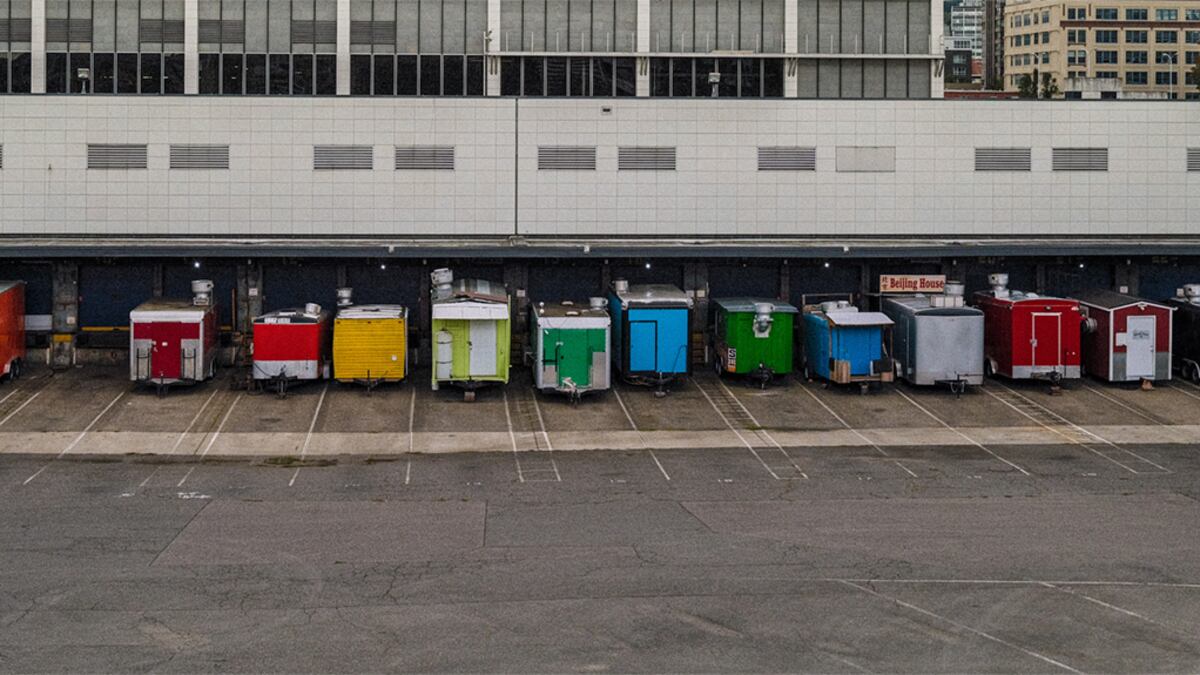Like a lot of people seeking to do business in downtown Portland, Keith Jones needed a permit from the city.
More than one, in fact: In June 2019, he needed permits from both Portland Parks & Recreation and the Portland Bureau of Transportation to relocate a food cart pod to the streets surrounding Ankeny Square park.
A year ago, Jones told the Portland Tribune the new cart pod was a few weeks from opening. "Now," he tells WW, "I'm afraid to say anything."
In a year when the pandemic crushed indoor dining, food carts are one of the few thriving sectors of the restaurant industry.
But after 18 months, Jones' project still lacks permits. And the two dozen food carts—which once anchored the city's oldest and largest pod on what's now the construction site of a Ritz-Carlton hotel—have been refugees.
For Jones, director of Friends of the Green Loop, a nonprofit that seeks to create a linear park linking Portland's central public places, the city is sending a puzzling message. (The proposed Green Loop has a culinary focus and runs through the Park Blocks, which include Ankeny Square.)
Mayor Ted Wheeler, his City Council colleagues, and groups such as the Portland Business Alliance are begging visitors to come back downtown.
"I'm hearing this cry for help from downtown, and we've got this great thing that is ready to go," Jones says. "But we can't get the permits."
One of the carts, Hua Li House, which served Thai-Chinese food, belongs to the family of Lily Chen, 24. Her parents, who speak only Cantonese, are unemployed, and Chen says they just got hit with a $350 personal property tax bill for the cart, even though it didn't serve a single meal last year.
For her, the situation can be summed up swiftly: "It's terrible."
For months, Jones has worked with Travel Portland, Prosper Portland and other groups to find a home for the carts, which got booted in June 2019 from Block 216, between Southwest 9th and 10th avenues and Alder and Washington streets.
From the moment the carts were evicted from Block 216—where the Ritz is rising—boosters have pushed for a relocation strategy.
"A lot of time and effort has been poured into this project," says Maureen Fisher, the PBA's director of downtown services. "There should be no reason to delay making it happen."
More than a year ago, Jones arrived at a plan: array the two dozen carts around Ankeny Square, a moribund half-block city park bordered by West Burnside and Southwest Ankeny streets and Southwest Park and 8th avenues.
Ankeny Square boasts valuable assets: two public restrooms, open space suitable for tables and chairs, and lots of foot traffic.
To be sure, achieving Jones' vision of closing off sections of nearby streets would require work on PBOT's part. And Jones would have to wrangle upgraded electrical infrastructure to support the carts.
Even before COVID-19, however, neighboring businesses were enthusiastic.
Geoff Phillips, owner of Bailey's Taproom at 720 SW Ankeny St., loved the idea of having two dozen food carts adjacent to his bar.
"It would have been huge," Phillips says. "The amount of foot traffic the carts generated in their former location was unbelievable."
But the pandemic closed Bailey's doors for good in September. Another nearby bar, The Alchemist, is gone as well. U.S. Outdoor, long a fixture around the corner from Ankeny Square, moved to the Pearl District.
For a while, Jones convened weekly meetings with the cart owners and city officials at Travel Portland's offices. Many of the cart owners, like the Chen family, are immigrants and, for many, a cart represented not only their life savings but their only source of income.
During the pandemic, PBOT has indeed issued permits for 700 businesses to erect outdoor seating on sidewalks and in parking spaces. And putting carts in rights of way is more complicated.
"State law requires months of public process and input from nearby landowners to close a street to vehicle traffic on a permanent basis," says PBOT spokesman Dylan Rivera. "We are exploring that option, as well as temporary options that could help us provide space for the food carts here hopefully much sooner."
Jones encountered the city's siloed form of government, in which each bureau reports to an elected commissioner rather than a city manager.
Still, many observers find it preposterous that "The City That Works" can't make this happen.
"I don't understand it," says Greg Goodman, whose family owns Block 216 and who has tried to help the carts relocate. "It's like the city almost has to go out of its way to make it happen. If you look at the people, mostly immigrants, who have lost their jobs, it's horrible."
It's perhaps even more telling that Jones even had political pull.
His ally: Marshall Runkel, chief of staff to Commissioner Chloe Eudaly, who oversees PBOT. Eudaly deputized him to make the project happen.
After working unsuccessfully on Jones' behalf for 18 months, Runkel says the experience has been educational.
"One of the lessons we should learn from this last horrible year is, we have to be a lot more nimble and we have to make our actions match our words," he adds. "Our odds of overcoming the challenges we'll face in the future go way up when we stop thinking bureaucratically and start thinking creatively."
Jones believes PBOT wants a solution. The bureau required him to get insurance all the way back in March—a cost his thinly financed startup has absorbed since then, even though Ankeny Square is closed off from the public by security fencing.
"If I don't get this done," Jones says, "I'm going to have to leave town."

